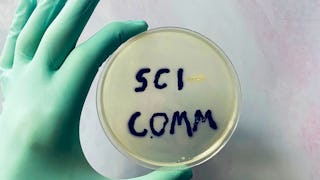In this course, you will explore different modalities of science communication, including oral presentations, written forms of communication, technology, and artistic media, including best practices for each.

Gain next-level skills with Coursera Plus for $199 (regularly $399). Save now.

Modes of Science Communication
This course is part of Designing Effective Science Communication Specialization

Instructor: Melanie Peffer
Included with
Recommended experience
What you'll learn
Explain best practices for oral, written, technological, and artistic forms of science communication.
Apply principles of learning engineering to design effective forms of science communication.
Skills you'll gain
- Human Learning
- Content Creation
- Writing
- Persuasive Communication
- Education and Training
- Photo/Video Production and Technology
- Liberal Arts
- Media and Communications
- Creativity
- Photography
- Education Software and Technology
- Driving engagement
- Storytelling
- Writing and Editing
- Psychology
- Technical Communication
- Instructional Strategies
- Science and Research
- Oral Expression
- Community Outreach
Details to know

Add to your LinkedIn profile
See how employees at top companies are mastering in-demand skills

Build your subject-matter expertise
- Learn new concepts from industry experts
- Gain a foundational understanding of a subject or tool
- Develop job-relevant skills with hands-on projects
- Earn a shareable career certificate

There are 4 modules in this course
Welcome to course 3! In the first module, you will learn important considerations for effective oral presentations, including best practices for giving live, recorded, and virtual presentations. In addition, we will also cover best practices for creating visual supports (poster, PowerPoint slides) to help communicate your message during an oral presentation. We will also discuss best practices for media interviews.
What's included
4 videos5 readings2 discussion prompts1 plugin
In this module, you will learn best practices for writing as a vehicle for science communication. Rather than focusing on grammar and general writing mechanics, this section will focus on how to effectively use the written form as a tool for science outreach, including how formal scientific writing varies from pieces for the general public.
What's included
3 videos3 readings2 peer reviews1 discussion prompt
In this module, you will learn about technological forms of science communication outside traditional media (e.g. written or oral communication). In this module, we will discuss how science is communicated through various forms of educational technologies, including computer games, simulations, and social media. We will also briefly discuss learning analytics and their utility in understanding learning in technology-based environments.
What's included
4 videos1 reading2 discussion prompts
In this module, you will learn about the importance of artistic forms of science communication. The arts can serve as an important gateway between scientists and the rest of society making difficult or abstract concepts feel more personal and less intimidating. Here, we will talk about use of art, such as photography as well as music to help feel others connected to science topics.
What's included
4 videos8 readings2 peer reviews1 plugin
Earn a career certificate
Add this credential to your LinkedIn profile, resume, or CV. Share it on social media and in your performance review.
Instructor

Offered by
Explore more from Education
 Status: Preview
Status: PreviewUniversity of Colorado Boulder
 Status: Preview
Status: PreviewIllinois Tech
 Status: Free Trial
Status: Free TrialUniversity of Colorado Boulder
 Status: Free Trial
Status: Free TrialUniversity of Colorado Boulder
Why people choose Coursera for their career





Open new doors with Coursera Plus
Unlimited access to 10,000+ world-class courses, hands-on projects, and job-ready certificate programs - all included in your subscription
Advance your career with an online degree
Earn a degree from world-class universities - 100% online
Join over 3,400 global companies that choose Coursera for Business
Upskill your employees to excel in the digital economy
Frequently asked questions
To access the course materials, assignments and to earn a Certificate, you will need to purchase the Certificate experience when you enroll in a course. You can try a Free Trial instead, or apply for Financial Aid. The course may offer 'Full Course, No Certificate' instead. This option lets you see all course materials, submit required assessments, and get a final grade. This also means that you will not be able to purchase a Certificate experience.
When you enroll in the course, you get access to all of the courses in the Specialization, and you earn a certificate when you complete the work. Your electronic Certificate will be added to your Accomplishments page - from there, you can print your Certificate or add it to your LinkedIn profile.
Yes. In select learning programs, you can apply for financial aid or a scholarship if you can’t afford the enrollment fee. If fin aid or scholarship is available for your learning program selection, you’ll find a link to apply on the description page.
More questions
Financial aid available,
¹ Some assignments in this course are AI-graded. For these assignments, your data will be used in accordance with Coursera's Privacy Notice.

